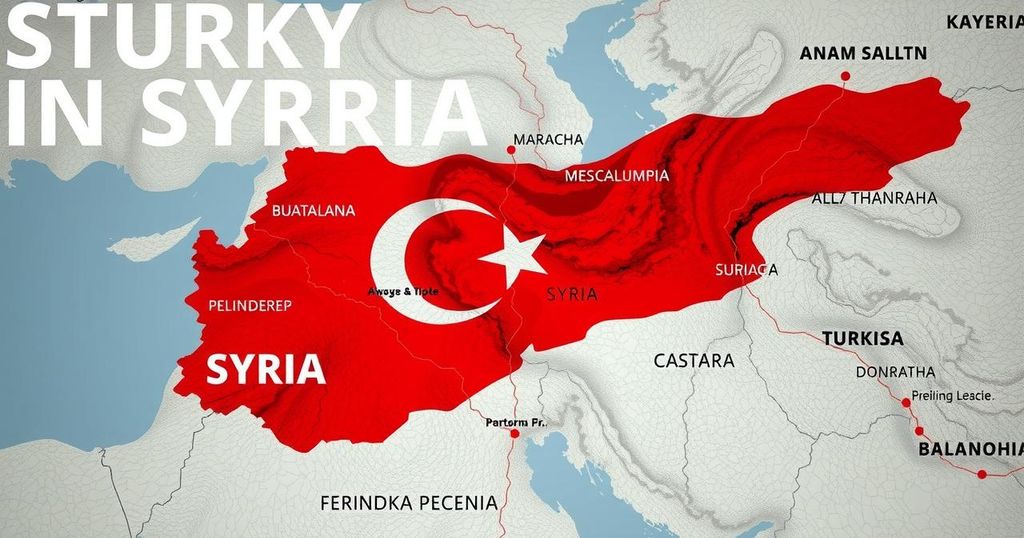World news
AHMED AL - SHARAA, ANKARA, ASIA, ASSAD, BASHAR AL - ASSAD, DONALD TRUMP, EUROPE/ASIA, FIGHTER JETS, HAY ' AT TAHRIR AL - SHAM, HEZBOLLAH, IDLIB, ISRAEL-HAMAS CONFLICT, ME, MIDDLE EAST, MIDDLE EAST AFFAIRS, NATIONAL COALITION FOR SYRIAN REVOLUTIONARY AND OPPOSITION FORCES, NORTH AMERICA, PALESTINE, RUSSIA, SYRIA, SYRIAN, SYRIAN CONFLICT, TURKEY, UNITED STATES, WAR
Oliver Grayson
0 Comments
Turkey’s Strategic Reassessment Following Transformations in Syria
The recent rapid changes in Syria prompted by the fall of Bashar al-Assad’s regime catalyze a pivotal shift in Turkey’s strategic role. Turkey, now a dominant force following the capture of key cities, seeks to stabilize the region by fostering governmental dialogue and facilitating the return of Syrian refugees. Ongoing challenges include managing Kurdish forces and ensuring the longevity of state institutions in a post-Assad scenario.
In light of the swift changes occurring in Syria, particularly following the rapid fall of Bashar al-Assad’s government, Turkey is reassessing its role and objectives within the region. The recent military operations led by Turkey-aligned Syrian opposition forces have resulted in significant territorial gains, including the capture of major cities such as Aleppo. Turkey’s strategy appears to pivot towards establishing a stabilizing force amidst a changing political landscape, emphasizing dialogue between the Syrian government and opposition while attempting to preserve national institutions.
Turkey’s involvement has been seen as instrumental, with significant support often directed toward the Syrian opposition groups. The Turkish Foreign Minister has been noted for engaging Russia in discussions about a new Syrian governance structure, reflecting Ankara’s intent to foster reconciliation and create a transitional government. Turkey’s existing governance model in northern Syria may serve as a foundational blueprint for future administrative frameworks for a post-Assad Syria. In this context, Turkey has underscored the necessity of maintaining existing state institutions to support the transitional process.
Furthermore, Turkey is mindful of the Syrian Democratic Forces (SDF) operating in eastern Syria, which pose challenges by controlling critical resources. The potential for negotiations between HTS and the SDF has been raised, but Ankara remains firm in its opposition to any SDF influence in predominantly Arab areas, signaling a willingness to act militarily if deemed necessary.
Critical to Turkey’s objectives is also the return of Syrian refugees, estimated at over three million, who currently reside in Turkey. With a significant portion of these refugees originating from the Aleppo region, the reopening of factories and economic corridors between Turkey and Syria is expected to facilitate this return over time. Although the complete repatriation of refugees may be unrealistic, conditions for security and reconstruction will have to be established to support a gradual return.
Turkey has maintained a pivotal role in the Syrian conflict since its inception, primarily supporting opposition forces against the Assad regime. As the Syrian military exhibited a lack of resilience, Turkey’s strategic calculations began to shift, anticipating a possible collapse of the Syrian government. The recent decisive actions undertaken by Turkey-aligned groups marked a significant point in the conflict, leading to widespread territorial control changes and necessitating a reevaluation of both Turkey’s involvement and the future governance of Syria post-Assad. The geopolitical tensions and shifting alliances, particularly involving Russia and Iran, also significantly impact Turkey’s strategies in the region.
Turkey’s immediate focus remains on establishing a stable and representative transitional government in Syria while ensuring the safety and integration of returning refugees. The intricacies of dealing with Kurdish forces, managing alliances, and reconstructing war-torn regions underline the multifaceted challenges faced by Ankara. As Turkey advances its interests, the nuances of dialogue and military preparedness will play a crucial role in shaping the future of both Turkey and Syria in this complex geopolitical landscape.
Original Source: www.middleeasteye.net




Post Comment